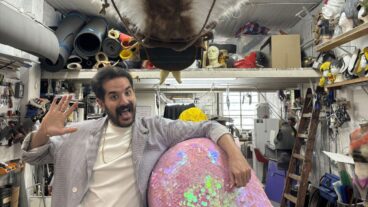President Moshe Katsav congratulates members of Bnei Sakhnin after their State Cup win at Ramat Gan Stadium last week.A recent sports victory has become a catalyst for increased pride in the Israeli Arab community, and a boost to efforts for increased coexistence, unity and equality between Israeli Arabs and Jews.
The trigger for such progress occurred last week in Israel when Bnei Sahknin made history as the first Arab Israeli soccer team to win the State Cup and the privilege of representing Israel in the European UEFA Cup tournament.
“This is what’s called the New Middle East and this shows the Arabs are here and they are an integral part of Israeli society,” said Bnei Sahknin’s Arab chairman Mazen Ghnaim after his team beat Hapoel Haifa 4-1 in Ramat Gan Stadium before 30,000 cheering fans.
“I was at the game, and I must say it was the first time that you could feel so much pride being both Arab and being Israeli,” Mohammed Darawshe, a prominent Israeli Arab and director of One Voice told ISRAEL21c. “It was a moment I don’t think the Arab fans who were at the stadium nor the tens of thousands out in the street ever felt so strongly before. There was a feeling of oneness – that we are embraced by the country and that we can succeed in Israel.”
Bnei Sakhnin is seen as a model of coexistence with six Jewish players mixed among its 10 Arab players – joined by four players from four different countries. Israel’s Arabs, who number some 1.1 million, are 18 percent of the country’s mostly Jewish population.
But the lines of ethnicity and nationality blurred as both Jews and Arabs celebrated the historic victory. As excited fans made their way home after the game to the northern Galilee town, spontaneous celebrations erupted, most prominently at the Fureidis junction, just north of the coastal town of Caesaria. Over 20,000 people celebrated into the night to mark the historic achievement.
For most Israelis, Sakhnin is known as the town which hosts annual “Land Day” commemorations for six Arab Israeli demonstrators killed by the police during protests against land confiscation in 1976. It was also in this town of 23,000 that two of 13 northern Arab Israelis were killed by the Israeli police during demonstrations of support to the Palestinians in the early days of the intifada, three and-a-half years ago. But after last week’s game, those incidents have faded to the back burner.
“Suddenly Sakhnin is not just connected to the riots of 2000 or Land Day confrontations, but it’s a place were Jews are seen as heroes,” said Darawshe. “The Jewish players were on the shoulders of Sakhnin residents until two in the morning, and the Jewish neighbors from nearby towns were right there celebrating with us.”
Following the game, Israeli president Moshe Katzav handed the trophy to Bnei Sakhnin captain Abbas Suan, and Prime Minister Ariel Sharon called to congratulate the team chairman, Mazen Ghnaem.
“I am sure you will represent Israel with honor in Europe,” Sharon said, according to a statement released by his office. He also reportedly promised to allocate $2 million to help build a new football stadium in Sakhnin. Unable to renovate their crumbling stadium, the cash-strapped club have had to play their home games 20 miles from Sakhnin in Haifa.
“I hope Sharon keeps his promise,” said Darawshe. “This is a great opportunity for government authorities and regional councils – both Arab and Jewish – to make a gesture of good will and not just leave emotion up in the air.”
Sakhnin’s mayor Bashir echoed those thoughts, adding that “Sakhnin is an inseparable part of Israel.”
The media in Israel led the way in fostering the message of unity following the game. “Sport has succeeded where others have failed,” wrote sportscaster Zuheir Bahloul in the largest daily paper Yediot Aharonot which splashed a huge banner headline saying ‘CONGRATULATIONS’ in Arabic.
According to Darawshe, the response of the media and soccer fans in general has been most encouraging. “The Israeli Arab community has been treated with such compassion, it’s unprecedented. I’ve never seen so many positive comments,” he said.
Even some Haifa fans weren’t too upset at the Sahknin win, despite its coming at the expense of their team.
“I’m happy that we lost to an Arab team,” 24-year-old Uri Hoenig told The Jerusalem Post. “It’s a little consolation for the loss. I hope it’ll improve our society and equality.”
Darawshe hopes the sporting achievements of Bnei Sakhnin will lead to Israel’s recognition that much more needs to be done in securing equality for Israeli Arabs and for fostering coexistence between the Jewish majority and the Arab minority.
“A lot of good can come out of this. You remember back to the China and U.S. ping-pong teams as being a turning point for relations between the two countries. If used properly and followed up with action, this victory could result in significant historic change.”












